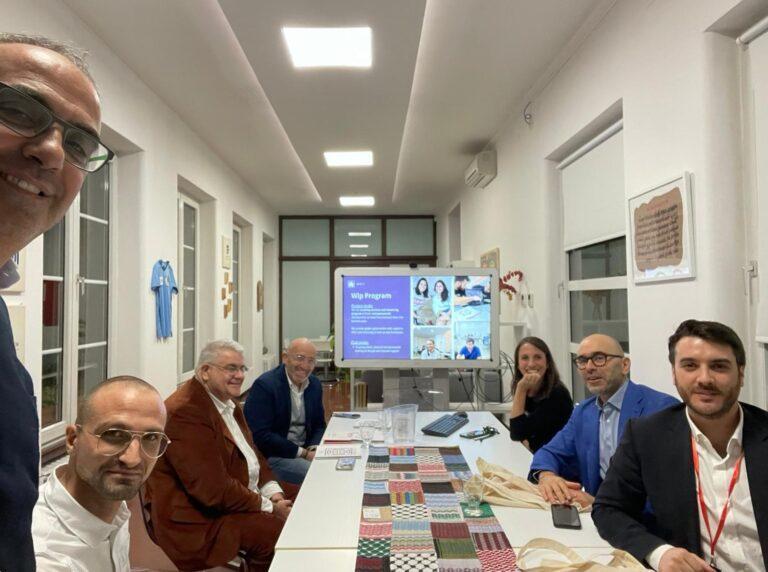The human eye is designed to be deeply adaptable to changes in its surrounding environment. When darkness falls and the shadows obscure vision, it takes only a few minutes for our eyes to learn to perceive even the faintest glimmers of light, to learn how to see again. Poet Emily Dickinson describes resilience in this way: the human ability to “adjust the eyes to deep night,” the capacity of life to always return to “walking almost straight again.”
This is a lesson the Lebanese people know all too well: even before the latest developments in the conflict, we have spoken of a resilient Lebanon, and not even missiles have managed to erode the dedication and determination of the people of the Cedars.
Building Resilience, One Startup at a Time
“The WIP project helps Pyckd, my business, and so it helps me; but it also helps me to help others.” George Daccache, founder and CEO of Pyckd—a Lebanese marketplace supporting local artisans—highlights the importance of being able to actively assist his community, something he values as much as the financial and professional support he receives. “WIP works on two levels, and I think that’s its added value: by supporting myself, I’m also able to support others, creating a virtuous cycle.”
Pyckd is a platform that supports small artisans in selling their products internationally. It was created to help sellers manage bureaucratic tasks, with the goal of automating product customization as much as possible and facilitating communication with customers. The platform provides producers with more tools to gain visibility and, consequently, buyers. “The ultimate goal is to create social impact, to help artisans. Certainly, facilitating the entry of 200 Lebanese vendors into the international market won’t dramatically change Lebanon’s economic situation,” George says with a smile, “but you have to start somewhere. And once they see that it’s truly possible to grow through a local platform, other artisans will want to join the project, extending its impact.”
Ayki, a small business conceived and run by Ara Abadjan, also inherently generates a positive impact on the country in multiple ways. “Small farmers can use my application to better plan their crops, avoiding missed opportunities. They can maximize the amount of food produced while ensuring the highest quality, even in limited spaces,” Ara explains. Ayki is a garden-planning app that offers useful advice for cultivating quality products and making the most of productive opportunities, allowing farmers to plan their crops for maximum yield. Ara has high ambitions: “We want to contribute to food security in Lebanon, in terms of both quality and food accessibility. This means helping produce nutritious, healthy food while keeping it affordable for everyone.”
Navigating Uncertainty with Innovation
The two entrepreneurs are very young but know war and the uncertainty it brings well. “In my village, Anjar, bombs fall all day, from morning to night,” Ara recounts. “Anjar is located in the Beqaa Valley, one of the hardest-hit areas at the moment. Being a Christian village, it’s one of the safer ones in the region, yet if we go a day or two without hearing explosions, we find it strange, wondering what happened.” “We’re used to it; it’s been this way for a long time in Lebanon. When the latest attacks began, I was elsewhere—in Dubai, visiting my brother,” George explains, “but I know the situation well—I’ve lived through it often.”
Precisely because of this familiarity with uncertainty and the inability to rely on long-term stability, Lebanese entrepreneurs have developed the ability to anticipate emergencies. “I knew something would happen in Lebanon—if not this year, then next year at the latest. So, when I set up the Ayki project, I made it completely digital so it wouldn’t be influenced by the state of the local economy or politics.”
Before being entrepreneurs, both Ara and George are young individuals actively supporting their community. Ara has a garden that he uses to “produce food, herbs, vegetables. Before this war, we supplied raw materials to about twenty local restaurants; today, eighteen of them have closed. So, I shifted to supporting displaced people taking refuge in our school. Twice a week, we send them what they need to eat. That’s how we do our part: helping each other coexist, sharing what we have.”
George, on the other hand, turned his love for animals into a shelter for abandoned pets: “Our shelter is called Johnny’s Shelter; Johnny was my cat, whom I adopted after finding him abandoned. We take care of pets that displaced families can’t bring with them until they can return home. We also cover medical expenses for those who can’t afford them.”
Betting on the Future of Lebanese Entrepreneurship
This drive to make a meaningful impact fuels their business visions. Investing in a country like Lebanon, categorized as a “gray zone” in international markets, is a high-stakes decision. As Ara explains, “Lebanon is seen as little more than a farm—not a country worth serious investment.” Investors remain wary, haunted by the 2019 crisis and the fear of losing everything.
Yet George and Ara remain steadfast, believing in their ideas and the transformative potential of their projects—not only for Lebanon but for the global market. Through WIP—with support from a group of Italian entrepreneurs and managers—they are receiving the mentorship and resources needed to turn their visions into reality. Step by step, their efforts challenge the global perception of Lebanese entrepreneurship, showcasing its seriousness and untapped potential.
By: proterrasancta






